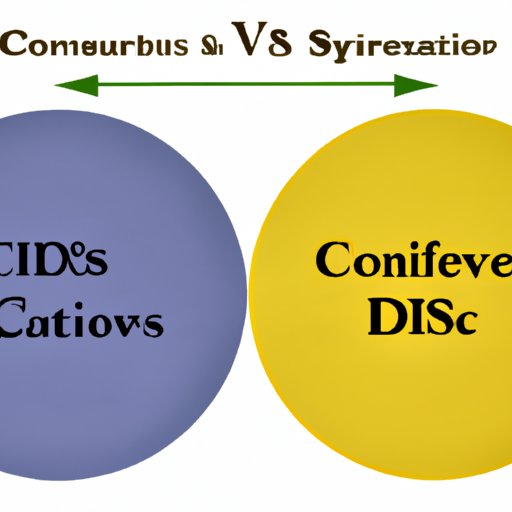Introduction
Investing can be a great way to build wealth, but it is important to understand the various options available to you. Certificates of deposit (CDs) are one of the most popular investment vehicles, offering a safe and secure way to save money and earn interest. This article will explore the pros and cons of investing in a CD, as well as other alternatives for those looking to invest their money.

Evaluating the Pros and Cons of Investing in CDs
When deciding whether or not to invest in a CD, it is important to consider both the advantages and disadvantages of this type of investment. On the plus side, CDs offer a guaranteed return on investment and are backed by the Federal Deposit Insurance Corporation (FDIC), meaning your principal investment is protected up to $250,000. Additionally, CDs generally offer higher interest rates than savings accounts, making them an attractive option for those looking to maximize their earnings.
However, there are some drawbacks to investing in CDs. For one, they require a minimum deposit, usually ranging from $500 to $5,000 depending on the financial institution. Furthermore, if you withdraw your money before the term is up, you may have to pay a penalty fee. Finally, CDs are not as liquid as other investments such as stocks or mutual funds, so you may not be able to access your money as quickly if you need it.
What Types of CDs Can You Invest In?
When investing in a CD, it is important to understand the different types available. CDs come in a variety of terms, ranging from 3 months to 5 years. Generally, the longer the term, the higher the interest rate. Additionally, there are several specialty CDs that offer unique features, such as variable interest rates or the ability to add additional money to the CD during its term.
For example, a jumbo CD is a type of CD that requires a larger minimum deposit ($100,000 or more) and offers a higher interest rate than a traditional CD. Similarly, a bump-up CD allows you to increase your return by taking advantage of higher interest rates if they become available during the term of the CD. Finally, a callable CD allows the issuer to call the CD before its maturity date, at which point you would receive your principal investment plus any accrued interest.
How to Calculate the Return on Investment for a CD
The return on investment (ROI) for a CD is calculated by subtracting the amount of your initial deposit from the total amount of money you receive when the CD matures. For example, if you invest $10,000 in a 1-year CD with an annual interest rate of 2%, your ROI would be $200: $10,200 (total amount received after one year) – $10,000 (initial deposit) = $200.
It is also important to factor in any fees or penalties associated with early withdrawal when calculating your ROI. For instance, if you were to withdraw your money after 6 months instead of waiting for the full term, you may have to pay a penalty fee that would reduce your overall return.

Understanding the Risks Involved With Investing in CDs
Although CDs are considered to be a relatively low-risk investment, there are still some potential risks to be aware of. One risk is that market interest rates could rise while your CD is still in effect, which means you could miss out on higher returns. Additionally, inflation could erode the purchasing power of your money over time, reducing the value of your CD.
To minimize these risks, it is important to keep your portfolio diversified by investing in a variety of assets. Additionally, it is a good idea to stay informed about current market conditions to ensure that you are getting the best return on your investment.
Examining the Tax Implications of Investing in CDs
When investing in a CD, it is important to understand the tax implications of this type of investment. Generally, the interest earned on a CD is considered taxable income and must be reported on your federal income tax return. However, there are some exceptions. For example, if the CD is part of an employer-sponsored retirement plan such as a 401(k) or IRA, the interest earned is not subject to taxes until the money is withdrawn. Additionally, certain CDs may qualify for tax deductions or credits if they meet certain criteria.
Comparing CDs to Other Financial Instruments
CDs are often compared to other types of investments such as stocks, bonds, and mutual funds. While all of these investments carry risk, CDs generally offer a lower level of risk due to their guaranteed return on investment. Additionally, CDs are often seen as a safer alternative to stocks and bonds, as they are not subject to market fluctuations.
On the other hand, mutual funds and other investments may offer higher returns than CDs, although they also involve a greater degree of risk. Additionally, these investments may provide more flexibility as far as when and how you can access your money.

Exploring Alternatives to Investing in CDs
For those looking for alternatives to investing in CDs, there are a number of options available. Money market accounts, high-yield savings accounts, and Treasury bills are all viable alternatives that offer higher interest rates than traditional savings accounts. Additionally, stocks, bonds, and mutual funds can be used to diversify your portfolio and potentially generate higher returns.
Finally, real estate investments such as rental properties or REITs can be a great way to grow your wealth and generate passive income. However, it is important to note that real estate investments involve more risk and require more capital than other types of investments.
Conclusion
Investing in a CD can be a great way to save money and earn a guaranteed return on your investment. However, it is important to understand the types of CDs available, how to calculate the ROI, and the risks and tax implications associated with this type of investment. Additionally, it is important to compare CDs to other financial instruments and explore alternatives before deciding which type of investment is right for you. Ultimately, the decision should be based on your personal financial goals and objectives.
(Note: Is this article not meeting your expectations? Do you have knowledge or insights to share? Unlock new opportunities and expand your reach by joining our authors team. Click Registration to join us and share your expertise with our readers.)
